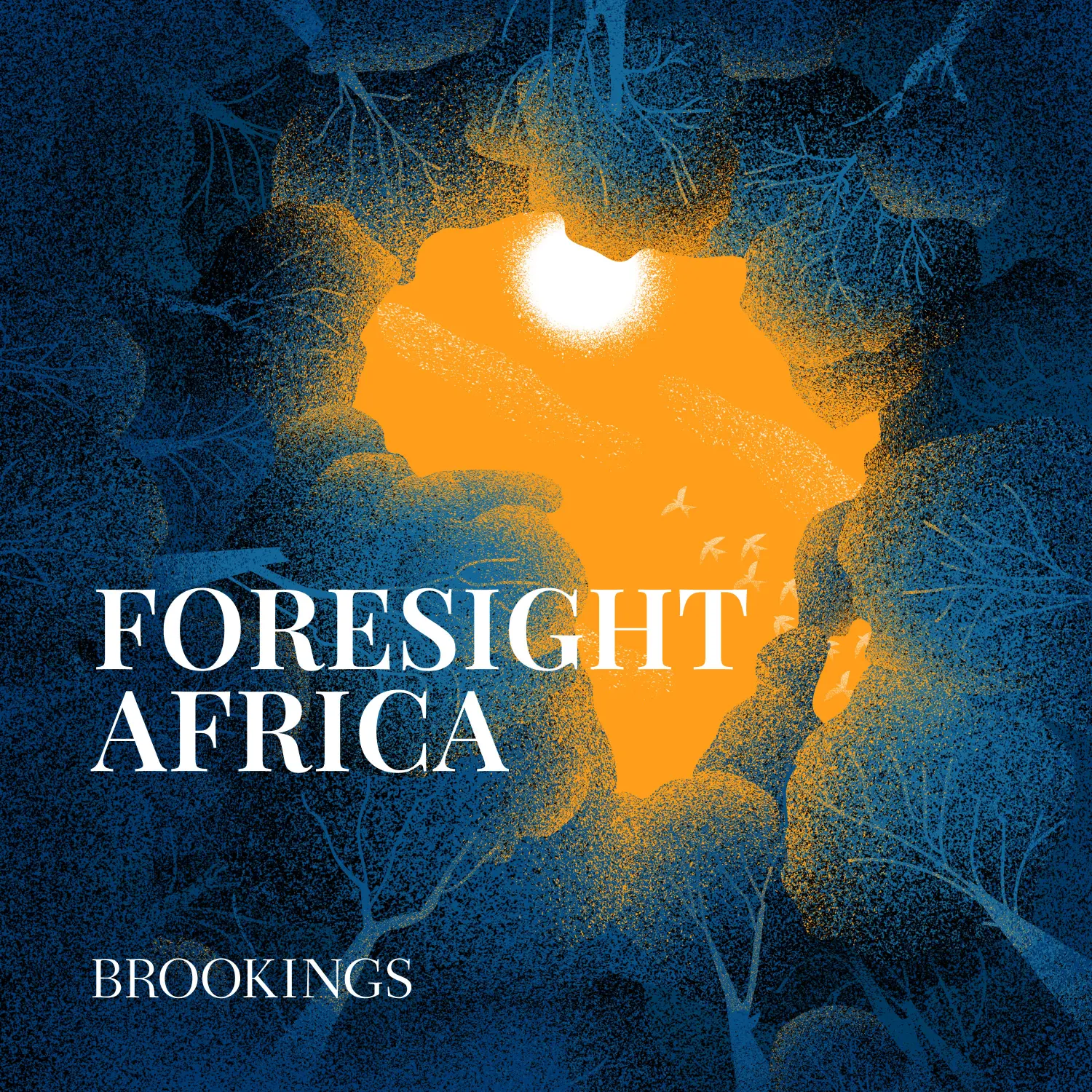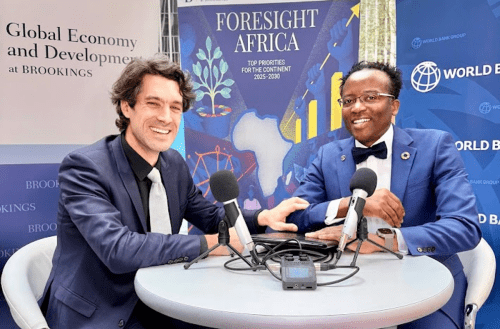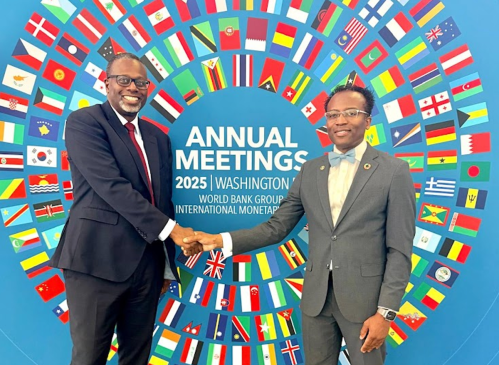From October 13-18, the World Bank and International Monetary Fund hosted their 2025 Annual meetings, gathering prominent figures in development finance from around the world. Foresight Africa was on the scene throughout the week to speak to some of these influential leaders making and shaping policy throughout the world.
In this interview, host Landry Signé speaks with Odile Renaud-Basso, President of the European Bank for Reconstruction and Development. For 34 years, the EBRD has supported private sector development and green investments in Europe and beyond. In this conversation, President Renaud-Basso describes how the bank is evolving to meet the economy of the future and its opportunities for expanding in Africa. Before she was elected President of the EBRD in 2020, Renaud-Basso was Director General of the French Treasury, vice-president of the European Economic and Financial Committee, and Chair of the Paris Club.
Transcript
LANDRY SIGNÉ: Hello, I am Landry Signé, a Senior Fellow in the Global Economy and Development Program and the Africa Growth Initiative at the Brookings Institution. Welcome to the Foresight Africa Podcast, where I engage with distinguished leaders in business, academia, policy and civil society to share their unique insight and innovative solutions to Africa’s challenges while highlighting opportunities to advance engagement between Africa, the US, and the rest of the world. Today we are fortunate to be meeting on the sidelines of the World Bank Group and International Monetary Fund Annual Meetings, a yearly gathering of the world’s most prominent figures in the development finance space, including central bankers, ministers of finance, heads of global and regional financial institutions, corporate CEO entrepreneurs and civil society leaders. Welcome to the Brookings Institution Foresight Africa Show Madam President.
RENAUD-BASSO: Thank you. Thank you for having me here.
LANDRY SIGNÉ: Before we begin, could you please state your full name and title.
RENAUD-BASSO: I am Odile Renaud-Basso President of the EBRD, European Bank for Reconstruction and Development.
LANDRY SIGNÉ: I am delighted to have you join me during this very busy week, and I truly appreciate you taking the time to share your powerful insights with our audience. As you take part in this year’s Annual Meetings. Which priorities do you see as most essential for driving sustainable and inclusive growth worldwide? And why?
RENAUD-BASSO: So I believe that, first of all, at a time where there are a lot of questions, a lot of challenges around multilateral institutions it’s very important to restate and, reaffirm the role of international cooperation and working together. So we as a multilateral institution with different shareholders, we have more than 70 shareholders, we know countries come from different perspectives, have different objectives. But being able to have common platforms where we have, we share the same agenda, some priorities is is very important. The core of the Bank and our mandate is to focus on the development of the private sector, and I really believe that developing the private sector is at the core of prosperity, roles and benefits to everybody.
This remains at the core of our mandate, but we have defined our new strategy, which I think addresses also the question you were asking, which are what priorities. And I would say for me that in our strategy, there are three priorities.
The first one is people, and to ensure that people are included in labor market, have access to jobs and can develop their businesses. People might mean man, woman. And we have program targeted to support inclusion of all people in in the economy and in the labor market. And this means, for example, we work a lot in Ukraine. We have a lot of focus. And 80% of our project have a human capital dimension, which is how to help people coming as veterans coming back from the war to reintegrate the labor market to find their place in the society.
The second big priority for us is institutions, good economic governance. If you have good institution, good regulatory framework, transparent institution, no corruption, it’s very good. It’s better for growth. It’s a condition for investment and for growth. And so that’s why it’s a big focus for us. It has always been, but we think now we will even do more in this area.
And the third one is green. We are all seeing the impact of climate change, loss of biodiversity, pollution, and so continuing to address that and invest in this area is very important for us.
LANDRY SIGNÉ: Fantastic. Madam President, what insights or lessons from these discussions or from your broader work should global leaders act on to strengthen resiliency and address today’s most pressing economic and social challenges?
RENAUD-BASSO: So I think that we are in a world where fiscal deficit and debt sustainability is a big issue in a number of countries. So the margin for public expenditure, budget constraints are there, and in a number of countries this is really a limiting factor for investing in infrastructure, investing in human capital, investing in healthcare, and so forth. And that’s why coming back to our mandate, the role of the private sector in this, in all these objectives can be very important. So I think that for one of the messages always thinking about ways where you can bring private sector in order to invest in this area.
And MDBs can play a role in development banking but also bringing private investors in the country and so forth. So one of the objectives of the discussion this week is also to see how we can mobilize more private investors together with our own investment.
LANDRY SIGNÉ: Fantastic. And how are international financial institutions adapting their own mandates and instruments to an ever evolving geopolitical, trade, and economic landscape? And where can they most effectively lead transformative change?
RENAUD-BASSO: So I think the first adaptation on this, how MDBs adapt to the new landscape, the first thing is to work more as a system. We have different MDBs. We have the World Bank covering all the world, IMF focusing on macro-financial issues, but also a lot of regional development banks. And I think that the capacity to work together is very important and we’ve been in the last few years enhancing our cooperation.
For example, we’ve developed some agreements to have mutual reliance for a client. If you have two financial institutions working on the same project, rather than having two different processes where all the due diligence are done by two, you have only one in the lead, and the other will follow. And so this is a way to simplify the life of our clients and to be more efficient, more rapid, more agile. So that’s one element.
The second element is to take into account all the trade tensions, all the impact we’ve seen from COVID, and the issue of reliability, diversification of supply chain and so forth. And now the reallocation of trade because of new trade policies from the US and so forth. A big focus on how to adjust to this evolution of the landscape, diversification of supply, reallocation of supply chain. And so for countries, this may represent some challenges, but it also represents some opportunities. And we see some reallocation. Some countries developing new manufacturing capabilities in order to deploy on new markets and so forth. So I think that’s something which we need to focus upon.
And the last point I wanted to make is also, as I was saying, the role of the private sector. To attract private sector, business environment, regulatory environment, rule of law is very important. But it’s also important that we MDB model to think about investing on our own balance sheet but also sharing with private investors. So changing a bit our business model towards an originate to business model where we bring more investors together with us.
LANDRY SIGNÉ: Fantastic. Madame President, I heard that you are developing a strategy to drive private sector investment in Africa. Will you mind sharing with our audience some of those priorities?
RENAUD-BASSO: So indeed, we are going to start investing in Sub-Saharan Africa. We were already present in North Africa, Egypt, Morocco, Tunisia, but now we are going to go in Senegal, Côte d’Ivoire Kenya, Benin, Nigeria.
LANDRY SIGNÉ: Oh, that’s amazing.
RENAUD-BASSO: And possibly Ghana also. And our priorities will be focusing on the private sector to support SMEs and to find ways to work with local financial institutions in order, for example, to develop some credit lines targeted to SMEs. We have a special program for women in business. Youth in business. We can also invest directly in some companies, either through equity, but also providing direct lending to companies of relatively, medium size, bigger size. Energy will be one of our top priorities. We work with the World Bank on Mission 300, and we will have investment in renewable and energy efficiency in these countries.
Broadly speaking, they all have a huge potential in terms of solar and wind, and I really think that the shift to renewable is a great opportunity for Africa to allow access to energy, but also to become an energy producer. And that will attract, if you have cheap energy that you can produce, it’ll attract also manufacturing capacities and so forth.
Absolutely. So this is an opportunity to increase in the value chain. We can, we will also develop an ability to invest in mining raw material and so forth, but an objective, always to move up into the value chain. To create value. New transformation in the country we work with on infrastructure projects. It can be water management, waste management, road railway and so forth. We are a demand driven bank. So we need absolutely to see the project from the clients and the government or state-owned enterprise in a more limited way. But still we can do that. Also municipal infrastructure. Whole bunch of priorities and we invest, but we can also provide policy advice and reform agenda. I think that’s one of the values, to promote reform that will unlock private sector investment. So for example, PPP regulation, public private partnership regulation, how you develop auction for renewables so that you have a framework which is conducive for private investment and so forth.
So a broad agenda, but we are very excited about that.
LANDRY SIGNÉ: I really love this comprehensive approach and many of the points that you highlighted included in my most recent book, Realizing Africa Potential, which was launched at Davos this year, 2025.
RENAUD-BASSO: I forgot to mention the digital. Which is a huge, huge potential I think in Africa, in many countries, in particular in Kenya. Very advanced.
LANDRY SIGNÉ: Absolutely.
RENAUD-BASSO: It’s leapfrogging from going directly to digital, which is amazing.
LANDRY SIGNÉ: Leveraging digital transformation, what some would call the Fourth Industrial Revolution, A.I and others to really unlock economic potential.
RENAUD-BASSO: And what I see, because we work in a number of emerging countries, also in Europe, the huge potential for Africa, which is a challenge, but it’s also a big asset, is the demography and the fact that these young people, young, new generation and so forth, is very innovative and is a huge potential at the time when the rest of the world is aging.
LANDRY SIGNÉ: We have the rising youth which could be a blessing if empowered with human capital. What a phenomenal initiative, Madame President, and let me finish: what bold, actionable ideas from this week do you see shaping global policies and practice, and how do you plan to translate them into tangible results or supporting other countries or the private sector to translate them into tangible results?
RENAUD-BASSO: As I was saying, the bank was created 35 years ago almost with this idea to develop market economies and develop the private sector. And it was focusing at the beginning on the communist countries that were really embracing market economies and and, private sector, and I think this whole idea remains very relevant in region like Africa. And it’s, for me, it’s two, there are two dimensions.
The first one is focusing our investment into private sector and ensuring that all the policies take into account how you can bring and leave room for private investors, when we work with state and enterprise, looking how they can transform so as to leave some place, some room for competitors and so forth.
And the second is how you bring private funding in the world where ODA is becoming very, limited.
LANDRY SIGNÉ: Absolutely.
RENAUD-BASSO: And countries are reducing their ODA.
So you need to find ways to attract private capital be it pension funds, insurance companies, and so forth in investing in Africa because there is this huge gross potential. It’s not completely, it’s not a new idea. But we need to find new ways to do that and so that it becomes a reality.
LANDRY SIGNÉ: What a beautiful way to conclude. Madame President, thank you so much for joining me today.
RENAUD-BASSO: Thank you very much.
LANDRY SIGNÉ: Amazing.
-
Acknowledgements and disclosures
The Foresight Africa podcast is brought to you by the Brookings Podcast Network. Send your feedback and questions to [email protected]. Special thanks to the production team including Fred Dews, producer; Dafe Oputu, and Nicole Ntungire, associate producers; Gastón Reboredo, audio engineer; and Izzy Taylor, communications manager in Brookings Global. The show’s art was designed by Shavanthi Mendis. Additional promotional support for this podcast comes from my colleagues in Brookings Global and the Office of Communications at Brookings.
The Brookings Institution is committed to quality, independence, and impact.
We are supported by a diverse array of funders. In line with our values and policies, each Brookings publication represents the sole views of its author(s).






Commentary
PodcastBrookings AGI at the Annual Meetings: The European Bank for Reconstruction and Development bets big on Africa
November 13, 2025
Listen on
Foresight Africa Podcast